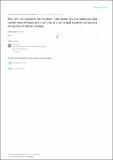| dc.contributor.author | Balkema, Annelies | |
| dc.contributor.author | Njau, Karoli | |
| dc.date.accessioned | 2019-07-04T07:28:13Z | |
| dc.date.available | 2019-07-04T07:28:13Z | |
| dc.date.issued | 2012-03 | |
| dc.identifier.uri | http://dspace.nm-aist.ac.tz/handle/123456789/342 | |
| dc.description | Conference Paper published by International Conference on Water Management Issues in Africa, At Mauritius | en_US |
| dc.description.abstract | The lack of access to safe drinking water and hygienic sanitation is still a major health treat
for many Africans. Especially in poor communities the situation is threatening as these
vulnerable communities are often affected most by climate change since they lack the ability
to cope or adapt to changes such as droughts, floods, conflicts, price fluctuation, etc (UNEP
2007, Chapter 7). In recent baseline studies conducted by TU/e students to assess the socioeconomic
status of people living in poor areas it was found that (Heijnen 2010, Balkema et
al 2010). Their quality of life can be improved by investing in basic services such as hygienic
sanitation to prevent diseases. | en_US |
| dc.language.iso | en_US | en_US |
| dc.publisher | International Conference on Water Management Issues in Africa, At Mauritius | en_US |
| dc.subject | Affordable sanitation | en_US |
| dc.subject | Constructed wetland | en_US |
| dc.subject | Reuse of water | en_US |
| dc.title | Win-win-win wastewater treatment: affordable hygienic solutions that enable reuse of water and nutrients to sustain food security and support mitigation of climate change. | en_US |
| dc.type | Article | en_US |

